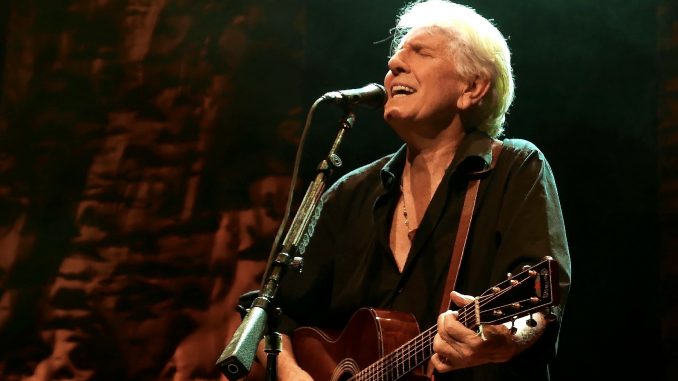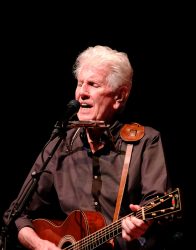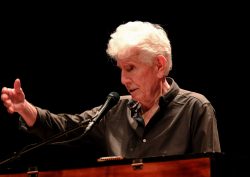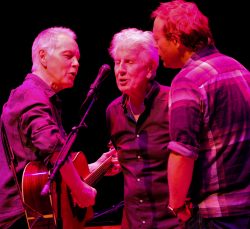
Outside, the Theatre Royal flashed, “Graham Nash Sixty Years of Songs and Stories.” Inside, bang on time, Nash strode onto the stage, waited for the heartfelt applause to subside before announcing, “I’m pretty old now and I’ve played in some wonderful places but this is something else.” Nash is 81 but to look at him, fit, svelte and relaxed you could be forgiven for thinking the advertising sign gave his age, not his career. Two hours later both age and career seemed all the more remarkable. What songs and what stories he told as he took his audience from his days in The Hollies through CSNY and their various line-ups right up to the solo album he released earlier this year.
Over two sets Nash flitted back and forth over those six decades. Neither chronological nor random, his selection gave full scope to what has mattered to him over that time. For someone who claims to write about ordinary moments his songs are anything but mundane. Whether people, places or beliefs Nash has consistently expressed himself so succinctly, at times even understated. He performed old favourites and new compositions with equal freshness in a voice remarkably free from the ravages of time. Flanked onstage by long-term collaborators guitarist Shane Fontayne and Todd Caldwell on keyboards, Nash looked both humbled by his welcome and up for a show.
‘Wasted on the Way’ served as an ideal opener. “Look around me I can see my life before me” sums up a long career while “And there’s so much time to make up” shows he is not done yet. If that was a statement of intent then ‘Bus Stop’ went right back to his friend since he was six, Allan Clarke, and their subsequent success in The Hollies. That Manchester rain, an umbrella and sixties pop could have been yesterday. Doubtless this reviewer was not the only one to wonder if we would hear ‘Marrakesh Express’ as the deadly impact of the earthquake in Morocco becomes more horrific each day. Unsurprisingly, Nash had his doubts too but went ahead on his manager’s advice, “it’ll be ok if you explain it right.” He did. What was a love of the hippy ideal held by those who travelled to Morocco became love to the people of that country.

Does that mean what Nash stood for is now redundant serving only as a nostalgic reminder of times long gone? Definitely not. Nash remains an activist whose anti-war stance has every bit as much relevance today as it did back in the 1970s. ‘Find the Cost of Freedom’, the B side to the CSNY 1970 single ‘Ohio’ may have been about Vietnam but harmonising with Fontayne and Caldwell, Nash offered a haunting preamble to ‘Military Madness’ from his debut solo album ‘Songs for Beginners’ released a year later. When applied to “Putin’s crazy war” the cry of “no more war” resonated soundly. Nash’s optimism to keep hoping for a better life also remains undimmed. Fast forward over forty years to this years release, ‘Now’. ‘A Better Life’ clings to that notion. There is no room for cynicism from this octogenarian caring for “kids and grand-kids.” Similarly another of Nash’s causes is the environment where ‘To the Last Whale…A. Critical Mass B. Wind on the Water’ has far greater impact today than its original release back in 1976. Part hymn, part lament, at his piano set back from centre stage, Nash created the distant seas where the whales live and die. The soundscape felt like that whole lifecycle shimmering with uncertainty.
Nash on peace and the natural world leaves a profound impression but perhaps the source of some of his finest writing is relationships, of especial poignancy being that with David Crosby. His tribute was heartfelt. First was ‘Taken At All’ from their 1976 ‘Whistling Down the Wire’, again around delicate guitar work Fontayne and Caldwell harmonised as thoughts around the theatre turned to Crosby. Nash, clearly still grieving, admitted, “I miss Croz so much every day he’s been gone and I will think of him every day until I die”. With lights turned down the darkened stage was funereal. Pausing at his piano you could hear Nash take a deep breath before singing what felt like an eulogy to his friend. Fittingly he ended the set with ‘Love the One You’re With’, accompanied by an entire theatre.

Nash turned to another relationship, opening the second set with Joni Mitchell’s ‘A Case of You’. With his solo acoustic guitar and harmonica the mere mention of “Oh Canada” was all it took for memories to flood back. Again, he swept through the decades from 1971 to this year and another new song, ‘Love of Mine’, prompted by an argument he’d had with his wife as he contrasted Fontayne’s lightest guitar solo with his harmonica, pleading reconciliation. Nash’s musical relationships were not always harmonious yet he covered Neil Young’s ‘Only Love Can Break Your Heart’ claiming “He wrote it for me”. That left Stills, “the best musician ever”, whose ‘4+20’ was a further example of Nash’s vocal command of even those most delicate CSNY songs.
Nash’s talent could be spontaneous and his subject anyone. In Hawaii he encountered a “low level drug dealer” who knew him to be “some hotshot song writer”. This new friend bet Nash $500 he couldn’t write a song in the hour or so before he left for home. Nash accepted and won his wager comfortably which amazingly reached him some years later. The result was ‘Just A Song Before I Go’, about the strains on a relationship from life on the road.

Nash ended on a happier note.“Aren’t we glad we’re getting Joni back?” he declared with joy returning to his theme of the ordinary as a source of songwriting. No prizes for guessing what was coming as he told the story behind ‘Our House’. Like Nash’s voice that picture of domestic bliss has lost none of its sweetness and love. The show did not quite finish there. Returning to the stage with, “We were The Hollies after all” Nash, Fontayne and Caldwell gathered around a single mic to give the lightest touch to ‘Everyday’. And could there be a more fitting final song than ‘Teach Your Children’ ? Audience and performers merged as they took turns singing what perhaps most encapsulates all that Nash believes in. His message was worth heeding in 1970 and this evening Nash gave us a timely reminder. May we get another nudge before too long. We’ll probably need it even more.



Deja Vu indeed.